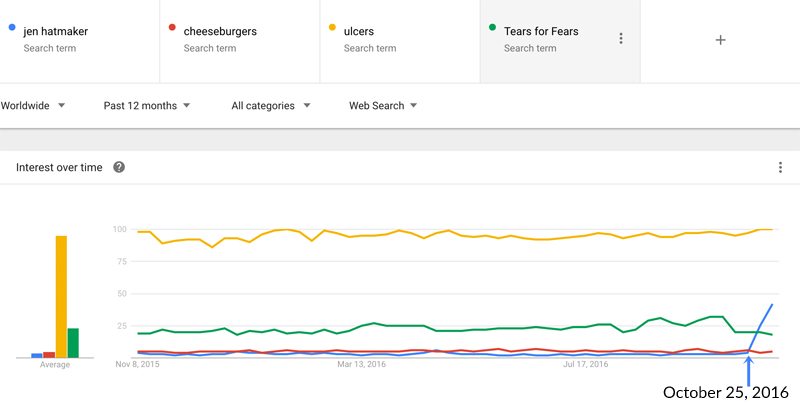Jen Hatmaker embracing gay marriage
is not the biggest threat to modern Christianity. But last month, you’d have thought it was.
If you don’t know who Jen Hatmaker is, I’ll forgive you, because a lot of the world doesn’t either. In fact, prior to October 25, 2016, she had pretty low interest on the web of the world, even though my Christian mom circles love her brand of transparent imperfection.
For example, her historic google interest popularity has hovered around a 7, a bit lower than our interest in cheeseburgers, miniscule compared to our downright obsession with ulcers, and not yet as wildly popular as the 80’s band Tears for Fears.
That is until October 25, 2016, when she said that an LGBT relationship could be holy.
Her position erupted in a firestorm of analysis and replies from The Washington Post to Christianity Today. Everyone wanted to weigh in on whether she was right or wrong and its impact on everything from the church to the election to her brand, which now features everything from clothes to earrings. (Sidenote from my strategy consultant brain: those new lines of business may come in handy given her potential decline in Christian market segments.)
LifeWay Christian Stores pulled her books. Her Christian friends felt pressed to weigh in. Former lesbian, now Christian author, wife, and mother, Rosaria Butterfield responded as well.
And finally, her husband, Brandon Hatmaker, also gave a lengthy explanation of their journey on this issue.
It seemed as if Hatmaker’s pronouncement, because of her large following, could threaten a basic and long-held belief of the Christian church.
But I am here to suggest… the greatest threat to modern Christianity is not that Jen Hatmaker has embraced gay marriage.
It’s that we care so much that Jen Hatmaker has embraced gay marriage.
As I read the comments on her Facebook page, I was struck by a deep sadness that was, at first, difficult to identify. I saw some commenters so angry at what they perceived was her abandonment of Biblical truth. I saw some followers validated by and celebrating her position. Some were concerned for her testimony and the impact of a leader’s position on other Christians.
And while Jen Hatmaker does not lead a church per se, she is perceived by some as a leader in the collective Church body. And that indeed places a greater responsibility on her words, for which she will answer before the Lord: “Let not many of you become teachers, my brethren, knowing that as such we will incur a stricter judgment. For we all stumble in many ways. If anyone does not stumble in what he says, he is a perfect man, able to bridle the whole body as well.” James 3:1-2 (NASB)
[tweet_dis_img inject=”Every Christian. Even on Facebook. Our Brand is Jesus.”] [/tweet_dis_img]Over the last few years, I’ve witnessed an incredible amount of admiration for and identification with her. She is often named as the woman you’d love to be friends with. Have coffee with. Do life with.
[/tweet_dis_img]Over the last few years, I’ve witnessed an incredible amount of admiration for and identification with her. She is often named as the woman you’d love to be friends with. Have coffee with. Do life with.
The world’s admiration of her person has, in many ways, eclipsed its recognition of her Jesus.
Jen Hatmaker is seen not so much as a servant of Jesus, in the trenches of ministry, but as a beacon of motherhood, in the trenches of authenticity.
And this trend is not limited to Jen Hatmaker and her 637,000 Facebook followers. The fingers of social media and the growth of media-driven popularity have just highlighted the fact that the celebrity culture of the world has permeated the church as well.
And in fact, cult of personality is not a new challenge in the church. Paul saw it in the early growth of the church at Corinth:
Now I mean this, that each one of you is saying, “I am of Paul,” and “I of Apollos,” and “I of Cephas,” and “I of Christ.” Has Christ been divided? Paul was not crucified for you, was he? Or were you baptized in the name of Paul? I thank God that I baptized none of you except Crispus and Gaius, so that no one would say you were baptized in my name. Now I did baptize also the household of Stephanas; beyond that, I do not know whether I baptized any other. For Christ did not send me to baptize, but to preach the gospel, not in cleverness of speech, so that the cross of Christ would not be made void.
1 Corinthians 1:12-17 (NASB).
In that case, the cult of personality was created by the followers and rebuffed by Paul. It doesn’t mean that Paul ceased being a teacher and preacher – a leader in the church, but he continually pointed his audience to Jesus. But in this world of Christian industry, bloggers, authors, and speakers, where personality often feeds the machine, it is a fine line between ministry and activity, between Christianity and personality.
Christian personalities can provide insightful information. They can inspire us. They can convict us. I count many Christian speakers and authors as friends and greatly admire their work and ministry. And their work, like many who work in secular fields, is not always focused around core Biblical teachings, and it doesn’t have to be. There are Christian accountants who do taxes. There are Christian doctors who set broken arms. Blogging about parenting is not un-Christian.
The work of “everyday” Christians in serving others, just like the work of Christian personalities or leaders, may not look the same on the outside as the work of a minister or pastor or priest.
But when Christians speak out in the context of Biblical truth, especially those Christians with a following, their words, including my words, should always be tested against the Word. Their perspective, their brand, my brand, should always be Jesus.
A variety of brands, with a broad array of beliefs, are being tagged as Christianity – from Joel Osteen to Oprah, Glennon Doyle Melton to Jen Hatmaker, Donald Trump to Tim Tebow. And it is up to us to sift the wheat from the chaff. But whether it’s people of wheat, but especially if it’s people of chaff, we should never be a more vocal follower of them than we are of Jesus.
And that is where Brandon Hatmaker got it right. “But I did write this to challenge each of you who have neglected the hard work of study, reading, discussion, and prayer to invite the Spirit to lead you. Don’t study to be right, study to find the truth. You have nothing to fear, trust that God will lead you. But wherever you land, don’t be ignorant and uninformed about it.”
[tweet_dis_img inject=”Our admiration of people should not be greater than our love for Jesus.”] [/tweet_dis_img]Whether it’s a topic of controversy or simply to learn how to love better, we should each be in the Word daily (not just the blogs) and be testing the words of leaders – be it pastors or Christian bloggers – against it. Even the best of them may not get everything right; like all of us, Christian leaders are not perfect. And when we believe they’ve missed the target, we love them anyway, and speak truth in love where appropriate.
[/tweet_dis_img]Whether it’s a topic of controversy or simply to learn how to love better, we should each be in the Word daily (not just the blogs) and be testing the words of leaders – be it pastors or Christian bloggers – against it. Even the best of them may not get everything right; like all of us, Christian leaders are not perfect. And when we believe they’ve missed the target, we love them anyway, and speak truth in love where appropriate.
We should never blindly follow another, no matter how much we want to have coffee with them, copy their sense of style, or admire their love and passion.
[tweet_dis]Our admiration of people, even loving and passionate people, should not be greater than our love for Jesus.[/tweet_dis]
Our love for people – even Christian leaders – should not overflow our lives more than our love for Jesus.
Our calling to serve people – gay people, straight people, murderers, sinners, orphans, saints – should not be greater than our love for Jesus.
Our passion for ministering to human souls, broken and pained, should never eclipse our passion for the pursuit of Jesus.
And although Tears for Fears might argue that “everybody wants to rule the world,” there’s only one who actually will.
As Christians, our admiration of people, our love for people, our calling to serve people, our passion for ministering to people, should come from the love for and knowledge of the gospel of Jesus Christ – both the easy parts and the incredibly difficult parts.


One response to “The Biggest Threat to Christianity is Not Jen Hatmaker”
It’s interesting watching the reactions to this event. Either she is celebrated and followed like a cult leader, or she is stoned as a false prophet. As usual there is no middle ground. We forget leaders are human, and commentary is filtered through fallen people. How do we keep all the great things she has said over the years, while still holding her accountable to things that don’t line up with scripture? It’s difficult, but I think all of life is trying to figure out how to live in the tension of gray. I don’t think Jesus wouldn’t cast her away, nor say all her past ministry is now invalid. I’ve learned a lot from her words so I don’t want to cut her completely from the fold.
Just some of my rambling thoughts since this all came out…